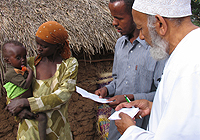Click here to read the full article on UNICEF website
2010 World Day of Prayer and Action for Children
By Claudia Rader
NEW YORK, USA, 3 December 2010 – Tens of thousands of Congolese Muslims gathering for prayers in Kinshasa’s Martyrs Stadium heard an unusual message this past Eid Al Adha when their imam, Sheikh Abdala Mangala Mwana Luaba, urged mothers to exclusively breastfeed their babies during the six first months of life.
In Kenya, meanwhile, the usually quiet Kahawa West Health Centre on the outskirts of Nairobi was buzzing with activity. More than 800 women and children waited for a battery of services offered free as part of Kenya’s ‘Malezi Bora’ (Good Nurturing) initiative, in which religious leaders promote maternal and child health in their communities.

Sittoni In Garissa, located in
Kenya’s North Eastern Province,
Prof. Abdulghafur El Busaidy,
chairman of the Supreme Council
of Muslims, follows up on the
progress of a child.
“I’m expecting my third baby,” said Hannah Maina, a young woman who had travelled 8 km to reach the health facility. “I had to come because on Sunday, our church pastor advised that expectant mothers should visit the clinic for free services,” she added.
Focus on breastfeeding
Similar scenes unfolded around the globe as part of the second annual World Day of Prayer and Action for Children, which mobilizes faith-based and secular organizations to work together for child well-being, particularly in the most disadvantaged and hard-to- reach communities. The day is observed on 20 November to coincide with Universal Children’s Day and the anniversary of the Convention on the Rights of the Child.
With UNICEF’s involvement, the 2010 observance promoted maternal health and child survival – particularly exclusive breastfeeding in the first six months of life, which stimulates babies’ immune systems and protects them from diarrhoea and acute respiratory infections, two of the major causes of infant mortality in the developing world.
In all, UNICEF supported activities in 20 countries, working with religious leaders to reach out across their vast networks and encourage their congregants in a range of positive health practices.
“This initiative enlists religious communities as equal partners in global efforts to achieve the Millennium Development Goals,” said UNICEF Director of Programmes Dr. Nicholas Alipui. “With their ability to influence behaviour at the family and community level and across all social strata, religious leaders have enormous power to effect real and lasting change in the lives of children.”
UNICEF-supported activities
Building upon its long history of working with religious leaders from all faiths on issues that affect children, UNICEF supported activities in 20 countries for the 2010 World Day of Prayer and Action for Children, including the following:
- Afghanistan, where the Ministry of Religious Affairs organized Friday prayers on children’s rights in mosques in Kabul and surrounding areas
- Algeria, where sermons in the country’s 15,000 mosques focused on children’s rights and the importance of breastfeeding
- Brazil, where religious leaders were involved in the launch of a nationwide campaign against racism
- Democratic Republic of the Congo, where the major religious groups, whose networks reach nearly 30 million people, led week-long campaigns promoting key family health practices such as breastfeeding and immunization
- Indonesia, where representatives from Islamic, Christian, Buddhist and Hindu traditions came together in Jakarta to plan a strategy for promoting breastfeeding among their followers
- Kenya, where government ministries and the Inter-Religious Council organized countrywide health campaigns focused on key child-survival messages, including exclusive breastfeeding
- Mauritania, where religious leaders led campaigns to encourage breastfeeding, and Friday prayers in every mosque were dedicated to child rights and health
- Nepal, where multi-religious coordinated activities, including regular weekly services, focused on maternal and child health
- Nigeria, where Christian and Muslim leaders nationwide delivered sermons about the benefits of breastfeeding and urged parents to bring children for free health services
- Sierra Leone, where the Inter-Religious Council organized weekly child and maternal health prayer services and community radio programmes by religious leaders as well as interfaith advocacy campaigns
- Swaziland, where representatives from religious groups, government and UN agencies planned actions to eliminate violence against children
- Zimbabwe, where observances attended by religious leaders and representatives of government and UN agencies, as well as regular Friday prayer and church services, focused on the promotion of exclusive breastfeeding.